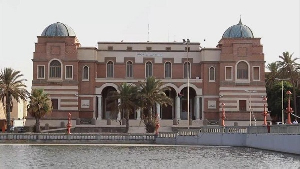 The regulator on Sunday said it wouldn’t resume work until its director is freed
The regulator on Sunday said it wouldn’t resume work until its director is freed
Libya’s presidential council on Sunday said it was replacing the central bank’s governor and board, setting the stage for a new political showdown after the regulator announced it was halting operations due to the kidnapping of one of its senior employees.
The presidential council, an internationally-recognized governing body based in Tripoli, said the unanimous decision to replace Governor Sadiq Al-Kabir and the board was aimed at “guaranteeing financial and economic stability,” according to a statement. The council didn’t mention the central bank’s decision to suspend operations in its statement.
The regulator earlier Sunday said it wouldn’t resume work until Musab Maslam, its director of information technology, is freed and back at his post. Maslam was snatched by an unidentified group in front of his home early Sunday, it said on its Facebook page, demanding that authorities step in and put an end to the climate of threat under which it operates. Local media reported he was later released.
The decisions by the council and the bank were likely to further stoke tensions in an OPEC nation that’s known little but chaos for over a decade. The country, which sits atop Africa’s largest proven reserves of crude, is split between rival administrations in the west and the east and frequent clashes are common despite a 2020 United Nations-backed cease-fire deal aimed at ending the fighting.
The central bank has itself fallen victim to the political tensions, with dueling institutions in Tripoli and in Benghazi in the east vying for control of the country’s oil wealth.
A 2021 reunification agreement that brought the two institutions together was hailed as a milestone for the troubled North African nation. Aside from that, however, little progress has been made on reconciling rival governments and armed groups.
Al-Kabir and the central bank didn’t immediately respond to calls for comment, and it was unclear if he would abide by the presidential council’s decision. In the past, other officials who were fired from their posts often refused to leave, triggering prolonged and often fatal clashes.
In explaining its decision to suspend operations until the employee was released, the central bank said on its Facebook page that “such practices threaten the security of the Bank employees and the ability of the banking system to continue functioning.” It also called on authorities to intervene, adding that other officials had also received kidnapping threats.
Also Sunday, an unidentified group briefly besieged the bank’s headquarters, local media reported, in what was described as an attempt to force the resignation of Al-Kabir, who has faced criticism over the management of oil revenues and the state budget.
The US’s special envoy to Libya, Richard Norland, on August 12 said in a post on X that attempts to oust Al-Kabir were “unacceptable” and warned that replacing him “by force can result in Libya losing access to international financial markets.”
“Disputes over distribution of Libya’s wealth must be settled through transparent, inclusive negotiations toward a unified, consensus-based budget,” Norland said.